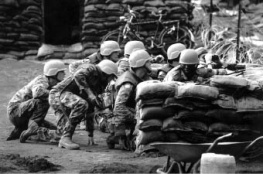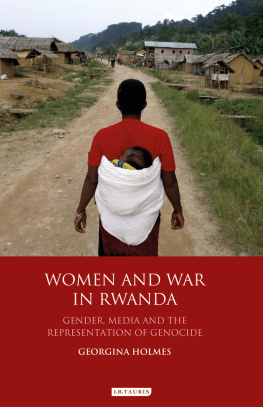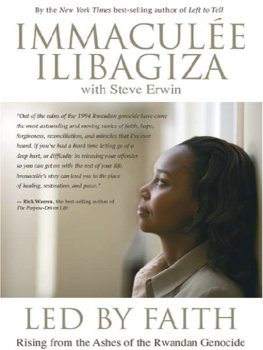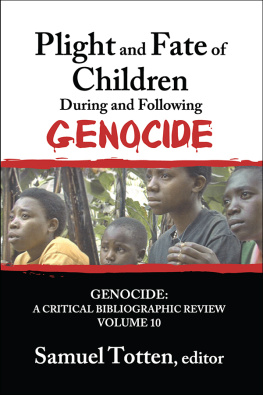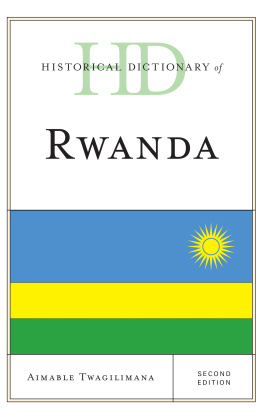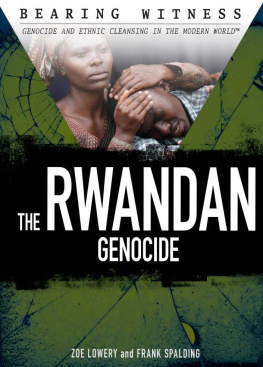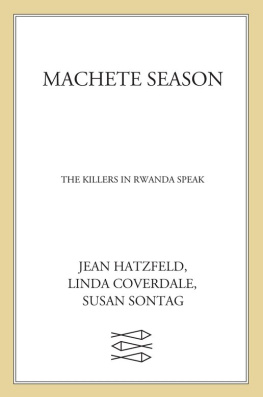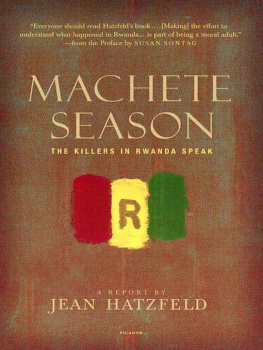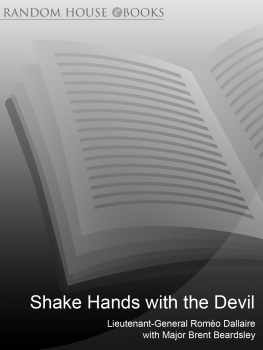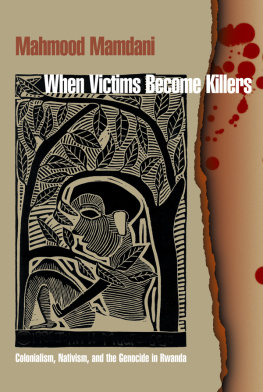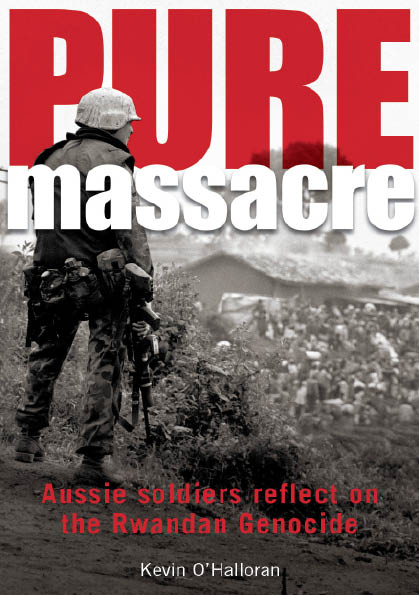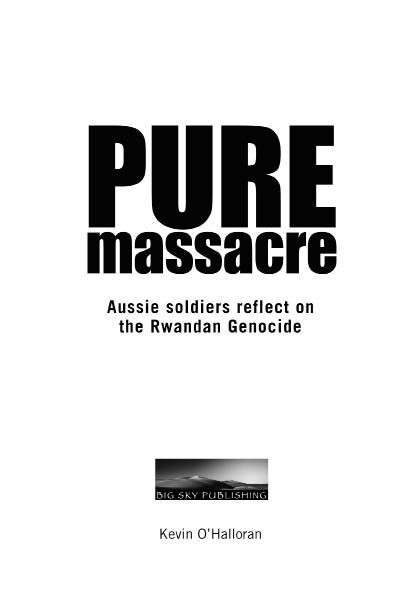Pure massacre
Aussie soldiers reflect on the Rwandan Genocide
Kevin OHalloran
BIG SKY PUBLISHING
Table of Contents
Honourable Scars
Curse of the Blue Helmets
Rwandas Long History of Violence
One Million Die in 100 Days
When Good Men Do Nothing
Un Mandate Unamir
Deployment to Rwanda Prelude to Massacre
Pure Massacre
Medics in the Maelstrom
Job Done
Our Hands Were Tied
Wheres the Justice?
Honours and Awards for Gallant Aussies
Acknowledgements
I am grateful to a number of people for their help and encouragement in the preparation of this book. Among them those Australian Defence Force (ADF) members who were deployed to the 2 nd United Nations Assistance Mission for Rwanda (UNAMIR II), who took the time to answer my questions or were interviewed to give their views on their individual service in Rwanda.
I know and appreciate how painful it must have been to recount those suppressed emotions. I hope I have repaid that slightly and in part, by publishing this book on your behalf to let the military history of this tragic event not go untold. Their thoughts are included throughout the book, at the end of each chapter headed, Reflections. Having so many share their perspectives allowed me to tell some of the story.
I would also like to thank Denny Neave for his endeavours and assistance with the writing of this book, my editor Mike Quirk, and my publisher Big Sky Publishing, for giving me the opportunity to finally tell this story.
A special thank you to Major General Guy Tousignant for your leadership during our operation, and for taking the time to review my work and write the foreword. Your support, encouragement and acknowledgment of the work we did will be appreciated by all who served in Rwanda.
Thanks to Dusty (Warrant Officer Class Two Andrew Miller) for his photos printed in this book. Thanks, too, to Buss (Warrant Officer Class One Brian Buskell) for letting me use his image on the front cover as well as to Robyn Bird who took the photo. In addition, I would like to thank everyone for their diary entries and to Eurls for the Kibeho poem.
I also wish to thank John Middleton of the Rwandan Coffee Club who are wonderful supporters of Rwandan genocide survivors now living in Australia and who provided us with Leatitias truly amazing story of survival. Leatitia, I hope you have now found peace here in Australia.
I have also drawn on many comments and views from those who were on Australian Services Contingent I and Australian Services Contingent II. I have brought all of these individual works together to try to gain a macro view of UNAMIR II. For me to take an individual approach would have been inherently flawed as no one soldier can be an expert in all spectrums of operations and each sees an event from a different vantage point. To that extent, I have also been somewhat reliant on the published and unpublished works of others to fill the gaps. Their collective views form part of this book, coupled with the expertise and advice of my fellow defence colleagues and researchers who have been involved in this book. I would also like to thank Paul Stanton and Pete Matthey for their support throughout this process.
The greatest debt for setting me off on the task to write this book must be paid to the men of 4 Platoon Bravo Company, 2nd Battalion, the Royal Australian Regiment ( 4B2 ). Without their incredible energy and commitment to have the truth told, this book would have been nigh on impossible. I wish to thank George Gittoes for kind permission to print his photographs and sketches of the Kibeho massacre.
The final word must go to my wife Michelle and our two children Sean and Siobhan who have tolerated a husband and fathers absence, without question, for many hours on end. That is why I have acknowledged them separately to the dedication of this book. I love them dearly and nothing is more important to me than they are. (Thanks, Jake).
Kevin Irish OHalloran
March 2010
Foreword
As I read Pure Massacre , I was reminded of an article that I wrote with a colleague from Care International for the World Policy Journal shortly before 9/11. My purpose was to discuss ways to reform peacekeeping in the field, but I also argued in that article that the number of civilians threatened by conflict worldwide was compelling evidence that peacekeeping was needed now more than ever. In other words, I claimed that peacekeeping had a place in the 21 st century. Naturally, when I wrote that article, it appeared to me that aside from trade, development and diplomacy, peacekeeping missions were the only instruments that were available to defuse conflict and protect civilians as a community of nations. That was the paradigm of the day, but I realise now, that it is no longer the preferred model.
In a similar vein, I had the pleasure in 2007 of participating in an event celebrating the 50 th anniversary of former Canadian Prime Minister Lester B. Pearsons Nobel Peace Prize, which was awarded for his significant contribution to the development of the peacekeeping concept. And while I was speaking about the good and the bad of peacekeeping, I was, nonetheless, promoting with great passion Mr. Pearsons vision for peace as being more relevant than ever in the 21 st century. For that occasion, I shared the podium with a professor from the University of British Columbia who made a very comprehensive presentation on peacekeeping from a historical perspective, and concluded by saying that, for Canada at least, the traditional peacekeeping approach as articulated by Mr. Pearson is a thing of the past. In the professors view, Canada would become more and more involved in conflicts such as Kosovo and Afghanistan, and would probably not return to peacekeeping missions such as Rwanda. Naturally, I didnt share his opinion, which made for an interesting panel discussion at the time.
The latest figures from the United Nations show that many developed countries appear to be turning away from traditional peacekeeping. For example, Canada, consistently among the top 10 contributors to UN peacekeeping missions before the turn of the century, has dropped to 63rd position with only 55 military personnel involved in peacekeeping today. While some people in Canada argue today that peacekeeping is dead, the demand for peacekeeping has not gone away and more than 85,000 UN peacekeeping soldiers are presently participating in 15 operations around the world.
It does not come as a total surprise to me that developed countries are not as keen to support peacekeeping as they once were. While peacekeeping has achieved important results over the years, too often successes have appeared miniscule against the more dramatic failures. These failures, both operational and political, were in large part linked to the flaws of the UN system and the shortcomings of the permanent members of the Security Council. It would appear, therefore, that the long overdue UN reforms put forward by the 2000 Brahami Commission were a case of too little too late that failed to appease the exasperation of contributing western nations.
In truth, however, the events surrounding 9/11 uncovered new threats to global security that made peacekeeping an inappropriate response in some cases. But the UN peacekeeping mission in Rwanda still remains the turning point that changed the way western nations would respond to conflicts and humanitarian crises in the future. Rwanda had brought so much shame on member states that UN reforms had to be put in place and a change in foreign policy in some contributing countries like Canada was inevitable. Among the reforms the UN Department of Peacekeeping Operations (DPKO) introduced was a complete restructuring of its operations centre in New York in order to be more responsive to the requirements of the commanders on the ground, and the introduction of a regional model relying on regional forces to contribute combat troops. And while I welcome the restructuring of DPKO, in the face of the diminishing trend of developed countries contributing to UN peacekeeping, the regional model poses a moral dilemma for me. A regional model of peacekeeping can only work if the developed world does not try to buy its way out of engagement and responsibility. We have not, in my view, improved the system, nor alleviated our consciences, by staying away.

